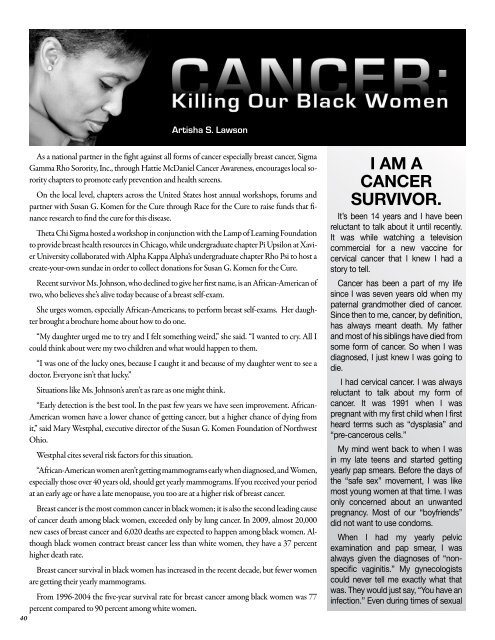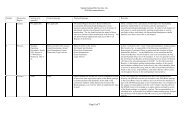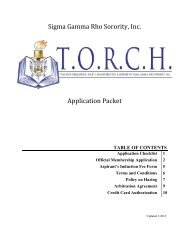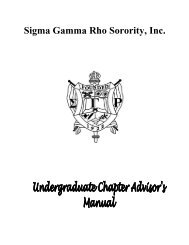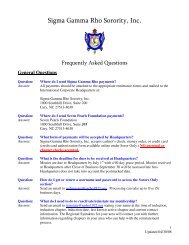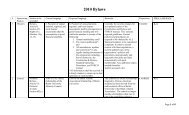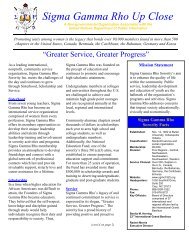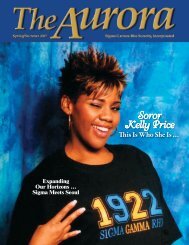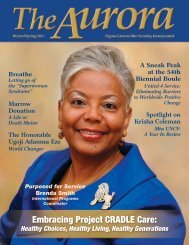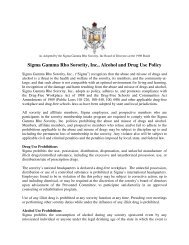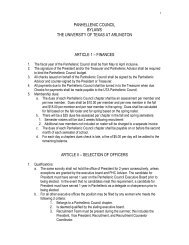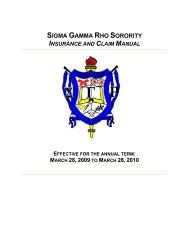Life is Precious - Sigma Gamma Rho Sorority, Inc.
Life is Precious - Sigma Gamma Rho Sorority, Inc.
Life is Precious - Sigma Gamma Rho Sorority, Inc.
You also want an ePaper? Increase the reach of your titles
YUMPU automatically turns print PDFs into web optimized ePapers that Google loves.
Art<strong>is</strong>ha S. Lawson<br />
40<br />
As a national partner in the fight against all forms of cancer especially breast cancer, <strong>Sigma</strong><br />
<strong>Gamma</strong> <strong>Rho</strong> <strong>Sorority</strong>, <strong>Inc</strong>., through Hattie McDaniel Cancer Awareness, encourages local sorority<br />
chapters to promote early prevention and health screens.<br />
On the local level, chapters across the United States host annual workshops, forums and<br />
partner with Susan G. Komen for the Cure through Race for the Cure to ra<strong>is</strong>e funds that finance<br />
research to find the cure for th<strong>is</strong> d<strong>is</strong>ease.<br />
Theta Chi <strong>Sigma</strong> hosted a workshop in conjunction with the Lamp of Learning Foundation<br />
to provide breast health resources in Chicago, while undergraduate chapter Pi Upsilon at Xavier<br />
University collaborated with Alpha Kappa Alpha’s undergraduate chapter <strong>Rho</strong> Psi to host a<br />
create-your-own sundae in order to collect donations for Susan G. Komen for the Cure.<br />
Recent survivor Ms. Johnson, who declined to give her first name, <strong>is</strong> an African-American of<br />
two, who believes she’s alive today because of a breast self-exam.<br />
She urges women, especially African-Americans, to perform breast self-exams. Her daughter<br />
brought a brochure home about how to do one.<br />
“My daughter urged me to try and I felt something weird,” she said. “I wanted to cry. All I<br />
could think about were my two children and what would happen to them.<br />
“I was one of the lucky ones, because I caught it and because of my daughter went to see a<br />
doctor. Everyone <strong>is</strong>n’t that lucky.”<br />
Situations like Ms. Johnson’s aren’t as rare as one might think.<br />
“Early detection <strong>is</strong> the best tool. In the past few years we have seen improvement. African-<br />
American women have a lower chance of getting cancer, but a higher chance of dying from<br />
it,” said Mary Westphal, executive director of the Susan G. Komen Foundation of Northwest<br />
Ohio.<br />
Westphal cites several r<strong>is</strong>k factors for th<strong>is</strong> situation.<br />
“African-American women aren’t getting mammograms early when diagnosed, and Women,<br />
especially those over 40 years old, should get yearly mammograms. If you received your period<br />
at an early age or have a late menopause, you too are at a higher r<strong>is</strong>k of breast cancer.<br />
Breast cancer <strong>is</strong> the most common cancer in black women; it <strong>is</strong> also the second leading cause<br />
of cancer death among black women, exceeded only by lung cancer. In 2009, almost 20,000<br />
new cases of breast cancer and 6,020 deaths are expected to happen among black women. Although<br />
black women contract breast cancer less than white women, they have a 37 percent<br />
higher death rate.<br />
Breast cancer survival in black women has increased in the recent decade, but fewer women<br />
are getting their yearly mammograms.<br />
From 1996-2004 the five-year survival rate for breast cancer among black women was 77<br />
percent compared to 90 percent among white women.<br />
I am a<br />
cancer<br />
survivor.<br />
It’s been 14 years and I have been<br />
reluctant to talk about it until recently.<br />
It was while watching a telev<strong>is</strong>ion<br />
commercial for a new vaccine for<br />
cervical cancer that I knew I had a<br />
story to tell.<br />
Cancer has been a part of my life<br />
since I was seven years old when my<br />
paternal grandmother died of cancer.<br />
Since then to me, cancer, by definition,<br />
has always meant death. My father<br />
and most of h<strong>is</strong> siblings have died from<br />
some form of cancer. So when I was<br />
diagnosed, I just knew I was going to<br />
die.<br />
I had cervical cancer. I was always<br />
reluctant to talk about my form of<br />
cancer. It was 1991 when I was<br />
pregnant with my first child when I first<br />
heard terms such as “dysplasia” and<br />
“pre-cancerous cells.”<br />
My mind went back to when I was<br />
in my late teens and started getting<br />
yearly pap smears. Before the days of<br />
the “safe sex” movement, I was like<br />
most young women at that time. I was<br />
only concerned about an unwanted<br />
pregnancy. Most of our “boyfriends”<br />
did not want to use condoms.<br />
When I had my yearly pelvic<br />
examination and pap smear, I was<br />
always given the diagnoses of “nonspecific<br />
vaginit<strong>is</strong>.” My gynecolog<strong>is</strong>ts<br />
could never tell me exactly what that<br />
was. They would just say, “You have an<br />
infection.” Even during times of sexual


